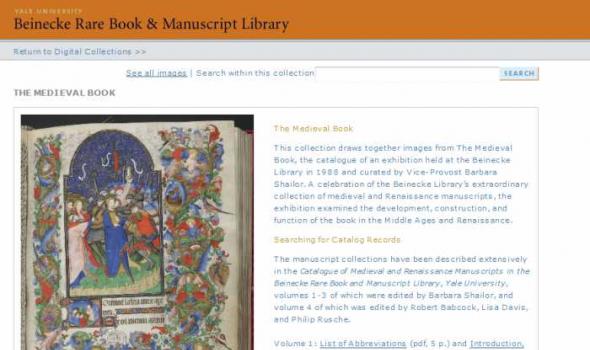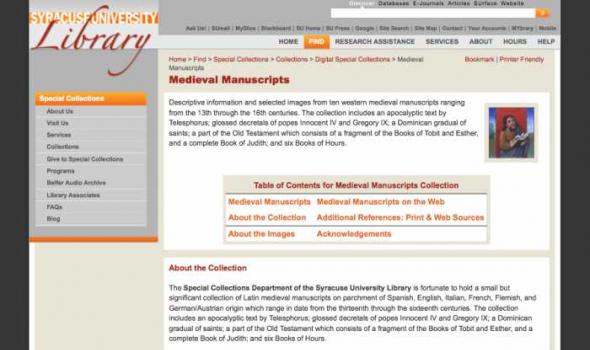Category: Literature & Poetry, Medieval manuscript
Results
About the Morgan | Introduction A complex of buildings in the heart of New York City, The Morgan Library & Museum began as the private library of financier Pierpont Morgan (1837–1913), one of the preeminent collectors and cultural benefactors in the United States. As early as 1890 Morgan had begun to assemble a collection of illuminated, literary, and historical manuscripts, early printed books, and old master drawings and prints. Mr. Morgan's library, as it was known in his lifetime, was built between 1902 and 1906 adjacent to his New York residence at Madison Avenue and 36th Street. Designed by Charles McKim of the architectural firm McKim, Mead & White, the library was intended as something more than a repository of rare materials.
This collection draws together images from The Medieval Book, the catalogue of an exhibition held at the Beinecke Library in 1988 and curated by Vice-Provost Barbara Shailor. A celebration of the Beinecke Library?s extraordinary collection of medieval and Renaissance manuscripts, the exhibition examined the development, construction, and function of the book in the Middle Ages and Renaissance. The manuscript collections have been described extensively in the Catalogue of Medieval and Renaissance Manuscripts in the Beinecke Rare Book and Manuscript Library, Yale University , volumes 1-3 of which were edited by Barbara Shailor, and volume 4 of which was edited by Robert Babcock, Lisa Davis, and Philip Rusche.
The Collection The Beinecke Library’s Medieval and Renaissance collections document the history of human thought from the Byzantine era through 1600. The first medieval manuscript recorded in the Yale collection was acquired in 1714, and was the gift of Elihu Yale. An illustrated copy of the Speculum humanae salvationis , it attracted the special attention of Yale President Ezra Stiles, who read the manuscript and annotated it in the 1790s. The systematic collecting of medieval manuscripts at Yale, however, dates from the late nineteenth century, and the most active period for collecting was after 1930.
The Arthurian Romances, or MS 229, is one of the jewels in the crown of medieval manuscript illumination. Written in Northern France toward the end of the 13th century, this copy of the great French romance is known for the abundance and richness of its illuminations, and even more so for the intricacy, mystery, and wildness of the images in the margins including animals, jesters, archers, and musicians. About the Codex Parchment, ff. i (paper) + 363 + i (paper). Written in elegant gothic textura by one scribe, with a few interlinear corrections in later hands.
Medieval Manuscripts Descriptive information and selected images from ten western medieval manuscripts ranging from the 13th through the 16th centuries. The collection includes an apocalyptic text by Telesphorus; glossed decretals of popes Innocent IV and Gregory IX; a Dominican gradual of saints; a part of the Old Testament which consists of a fragment of the Books of Tobit and Esther, and a complete Book of Judith; and six Books of Hours. About the Collection The Special Collections Department of the Syracuse University Library is fortunate to hold a small but significant collection of Latin medieval manuscripts on parchment of Spanish, English, Italian, French, Flemish, and German/Austrian origin which range in date from the thirteenth through the sixteenth centuries.



















